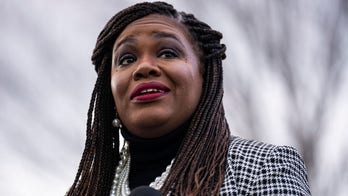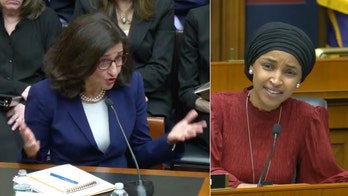An American imprisoned for aiding the Taliban in Afghanistan, a former congressman who took gobs of cash from government contractors and a former New York City police officer convicted of sodomizing a prisoner are all seeking President Bush's forgiveness in the weeks before Inauguration Day.
After the president granted 18 pardons and one commutation earlier this week, a handful of high-profile prisoners -- and thousands of others -- are still hoping he will grant their appeals before he leaves the White House.
But Bush has proved one of the most cautious presidents in modern history when it comes to exercising his clemency powers.
To date, he has granted 189 pardons and nine commutations. Compare that with the 396 pardons and 61 commutations granted under President Clinton, or the 393 pardons and 13 commutations granted under President Reagan, and Bush's record signals applicants will have a tough time in the weeks ahead convincing him to overturn the will of the courts.
"Bush has certainly been less generous in terms of pardons than perhaps any other modern president," said Jonathan Turley, legal expert and professor at George Washington University. "He obviously has very little sympathy with people seeking pardons or commutations."
The president is particularly stingy when it comes to commutations of prison terms. Where a pardon is an official forgiveness of a crime (typically requested at least five years after the completion of a prison term), a commutation is a reduction of sentence.
Most of the high-profile applicants seeking clemency from Bush are requesting commutation, and Bush, who's received more than 8,000 such requests since taking office, has granted commutation at a rate of about once per year.
Department of Justice spokeswoman Laura Sweeney said the president could grant more clemency requests before leaving office. But she said applications are still "under review."
The list of applicants includes some notorious former officials as well as other white-collar criminals.
Randall "Duke" Cunningham, a former Republican congressman from California, is among those seeking a commutation from Bush. Cunningham pleaded guilty to conspiracy and other charges for accepting $2.4 million in bribes in exchange for steering defense contracts to conspirators. He was sentenced to eight years in prison in 2006.
Former Democratic Louisiana Gov. Edwin Edwards, who was convicted in 2000 on racketeering charges and later sentenced to 10 years in prison, is also appealing to the president for a reduction of sentence.
Former Republican Gov. George Ryan of Illinois is doing the same. Though he's served only one year of his six-and-a-half year sentence -- he was convicted on racketeering charges in connection with a host of schemes, including steering contracts to lobbyists and covering up bribes paid in return for truck drivers' licenses -- he's earned the support of figures like Illinois Sen. Dick Durbin, a Democrat who recently sent a letter to Bush asking for Ryan's release.
Ryan's wife, Lura Lynn Ryan, reportedly wrote a letter to Bush asking that the former governor be released so he can return home and assist her with health problems.
But Ryan's request could be imperiled by the scandal surrounding Illinois' current governor, Rod Blagojevich, who was arrested earlier this month on corruption charges and has been accused of trying to auction off President-elect Barack Obama's vacant Senate seat.
Lura Lynn Ryan had no comment on the clemency request when reached at her home by FOXNews.com.
P.S. Ruckman Jr., an associate professor of political science at Rock Valley College in Illinois who runs the blog PardonPower.com, said the already dim odds for clemency applicants might have just gotten dimmer, after the Bush administration took the extremely rare, and somewhat embarrassing, step of rescinding a pardon on Wednesday.
Bush took back a pardon he gave just the day before to Brooklyn developer Isaac Robert Toussie, who had been convicted in connection with a real estate scam. White House press secretary Dana Perino said the decision was "based on information that has subsequently come to light," including the extent and nature of Toussie's prior criminal offenses. She also said that neither the White House counsel's office nor the president had been aware of a political contribution by Toussie's father to the Republican Party that "might create an appearance of impropriety."
"With this Toussie thing, I think Ryan and Edwards might be off the table now, if they ever were on the table," Ruckman said. "Right now there's a sense that you don't have a snowball's chance."
Experts say Bush is unlikely to grant a sudden spree of pardons, as Clinton did on his last day in office in 2001. Clinton stirred harsh criticism for the 11th-hour pardons of figures like Marc Rich, a fugitive from justice who was being prosecuted for numerous counts of tax evasion, and the president's half-brother Roger Clinton, who had a past drug conviction.
But there's always the chance for surprises, especially during a president's final days in office.
More than 2,100 clemency petitions are still pending before the president.
One high-profile commutation request before Bush is from John Walker Lindh, the American who pleaded guilty to aiding the Taliban in 2002 and was sentenced to 20 years in prison. Lindh's parents have appealed to the president for their son's release, saying he made a "mistake."
Media mogul Conrad Black, who was convicted of fraud, is also seeking commutation, and former junk bond salesman Michael Milken, convicted of securities fraud, has requested a pardon, which is under review.
Justin Volpe, the former New York City police officer sentenced to 30 years in prison for sodomizing and assaulting a Haitian immigrant in police custody in 1997, has also requested a commutation.
Sweeney said former track champion Marion Jones, who was jailed for lying about steroid use, had requested a commutation, but her case was closed without action after she was released from prison earlier this year.
One of the most significant clemency decisions by Bush so far was the call to commute the 30-month prison sentence of I. Lewis "Scooter" Libby, Vice President Dick Cheney's former chief of staff, who was convicted of perjury and obstructing justice in connection with the 2003 leak of then-CIA operative Valerie Plame's identity.
Libby was left with two years' probation and a $250,000 fine; he has not requested an official pardon from the president.
There are a number of notable political figures who have not requested clemency from Bush, including lobbyist Jack Abramoff, former Ohio Rep. Bob Ney and Alaska Sen. Ted Stevens, who was recently convicted for failing to disclose tens of thousands of dollars in gifts and services. But a convict does not have to formally request clemency in order for the president to grant it.
Most of the commutations Bush has granted have been in regard to drug convictions.
The latest set of clemency orders included a posthumous pardon for Charles Winters, who was incarcerated for violating a U.S. arms embargo in connection with his role in helping send aircraft to Jewish fighters in 1948. Winters was considered a key supporter in the fight for Israel's independence. His pardon was sought by his son, Miami resident Jim Winters, as well as Florida's congressional delegation.
Turley said another possibility for Bush is to grant a preemptive, blanket pardon for those involved with the administration's harsh interrogation programs and electronic surveillance programs.
"It would be very controversial," Turley said.
Ruckman said few expect Bush to carry out such a bold act.
The Associated Press contributed to this report.




